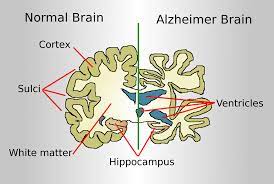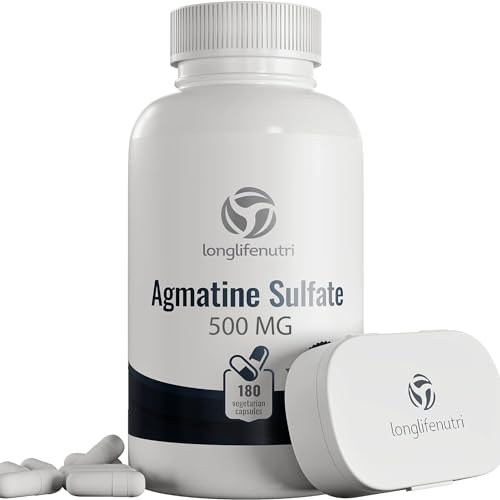Agmatine for Memory Impairment: Natural Treatment for Dementia
Agmatine is a substance that exists naturally in the brain and body. With aging, agmatine levels drop in the areas of the brain that are responsible for the creation of our personal narrative and a sense of meaning. Agmatine levels also drop in areas of the brain that are associated with memory. As such, this substance has become the focus of intense research in regard to neurological problems such as dementia.What is Agmatine?
Agmatine is a derivative of L-arginine. It is a substance that exists naturally in the body, but that can be supplemented to produce a variety of positive neurological benefits. As a supplement with a very low toxicity and powerful effects on memory and learning, agmatine can be a valuable adjunct treatment for dementia.
Click here to learn more about what agmatine is and what it can do for human health.
Agmatine to Improve Learning and Memory
Learning and memory are essential processes for humans. Synaptic connections between neurons play a major role in brain plasticity which is essential in learning and memory. Agmatine has been used to improve memory and learning in humans in part by decreasing avoidance when administered 1 hour before a learning or memory session. In contrast, agmatine has also been shown to reduce memory of contextual and auditory fear conditioning which is relevant in terms of PTSD and complex PTSD. Essentially, agmatine improves memory and learning that is normal and healthy, but it helps the brain release negative memories that produce a fear response via its action on certain areas of the brain that specifically deal with fear.
Click here to read more about how to use agmatine for complex PTSD and PTSD.
During a learning activity, agmatine is shown to increase by up to 6 times compared with a control group. This suggests that natural agmatine that’s produced in the body is modulated during the process of learning something new. Agmatine supplements have been shown to improve the cognitive performance of rats particularly in regard to spatial memory and working memory.
Studies have shown that the administration of agmatine prior to training or a learning experience improves learning. In contrast, taking agmatine after training or a learning experience has no effect on the consolidation of memory. The moral of the story here is to take agmatine prior to doing a learning task, or take it up to 4 times daily in divided doses of about 750 mg each to ensure that this substance will be available to your brain to enhance the memory and learning process.
The studies that have been done on agmatine as a natural substance to improve learning and memory has captured the attention of scientists who study possible cures for dementia. Below we discuss some of this research which shows that agmatine can be a useful adjunct therapy for Alzheimer’s as well as for Parkinson’s disease or Lewy Body Dementia. Indeed, agmatine, as a natural substance with extremely low toxicity, can be a useful adjunct therapy for dementia of all different types, including vascular dementias among others.
Click here to read about the relationship between Parkinson’s disease and Lewy Body Dementia and how this relationship can help patients find cures for both.
 Nutricost Agmatine 100 Grams - Pure Agmatine Powder 100 Servings (Agmatine Sulfate)
Nutricost Agmatine 100 Grams - Pure Agmatine Powder 100 Servings (Agmatine Sulfate)
Agmatine for Alzheimer’s Disease
Alzheimer’s disease is the most common cause of dementia in older adults. There are two hallmark characteristics of Alzheimer’s disease:- The accumulation of amyloid-beta-peptide
- The presence of neurofibrillary tangles of the microtubles binding protein tau
The presence of amyloid peptides combined with the activation of glial cells in the brain are believed to cause a dysfunction in the synapses. This includes synaptic loss, and neuron death along with the loss of memory function, diminishing intellect, and a reduced ability to learn new things.
Despite the fact that there have been numerous studies demonstrating that agmatine plays a role in memory and learning, there have been only a few studies showing that agmatine could have a positive impact on Alzheimer’s disease. Nonetheless, some scientists have acknowledged that given the existing data, agmatine supplementation may be able to treat Alzheimer’s disease naturally. And because this substance exists naturally in the human body and it has such a low toxicity, patients can try using agmatine at home and decide for themselves if it can naturally reduce the symptoms of Alzheimer’s disease.
Agmatine for Parkinson’s Disease and Lewy Body Dementia
Although the degeneration of dopamine neurons is the most well-known and well-studied cause underlying Parkinson’s disease symptoms, a number of other studies have shown that the glutamatergic system also plays a role in the development of this disease. In Parkinsons’ patients, an increase in glutamatergic transmission in the basal ganglia can be toxic to dopamine neurons, which in turn, can cause Parkinson’s disease to progress. As a substance that modulates the glutamate system of the body, agmatine can reduce the pathological destruction of dopamine neurons.Studies have shown that the use of agmatine supplements to protect dopamine neurons from destruction due to Parkinson’s disease can provide at least partial protection of about 31% which is noteworthy. Indeed, pre-treatment with agmatine has been shown to prevent the appearance of cognitive, motor, and neurological impairments in models of Parkinson’s disease. As an adjunct treatment for Parkinson’s and Lewy Body Dementia agmatine would work well with Methylene Blue, magnesium, high-dose vitamin C, NAC and Mucuna pruriens.
Click here to read about the use of Methylene Blue, vitamin C, Magnesium, NAC, and Mucuna to treat Parkinson’s disease naturally.
 Nutricost Agmatine Sulfate 1000mg, 120 Capsules - Gluten Free, Non GMO, 500mg Per Capsule
Nutricost Agmatine Sulfate 1000mg, 120 Capsules - Gluten Free, Non GMO, 500mg Per Capsule
Agmatine Dosage for Dementia
Start with a lower dose (500 mg) and increase the dose weekly by 250-500 mg as long as the patient is responding well to treatment. Higher doses up to 3500 mg are well tolerated over long periods of time. Note that there is a biphasic effect with agmatine dosing where negative or traumatic memories may be impaired at lower doses (which can be valuable in the treatment of anxiety disorders that involve trauma). At higher doses, memories are generally enhanced (including negative memories).Click here to read more about agmatine and general agmatine dosing recommendations.
 Click here to subscribe to the Living Database!
Click here to subscribe to the Living Database!
Resources:

 Agmatine is a substance that exists naturally in the human body, but it can also be taken as a supplement. Agmatine can protect the brain from up to 31% of the damage that is caused by dementia as a disease-process.
Agmatine is a substance that exists naturally in the human body, but it can also be taken as a supplement. Agmatine can protect the brain from up to 31% of the damage that is caused by dementia as a disease-process. LongLifeNutri Agmatine Sulfate 500mg - 180 Veg Caps | Pre-Workout | Nitric Oxide Supplement | Strength & Focus Booster | Supports Muscle Recovery
LongLifeNutri Agmatine Sulfate 500mg - 180 Veg Caps | Pre-Workout | Nitric Oxide Supplement | Strength & Focus Booster | Supports Muscle Recovery














